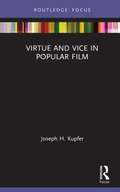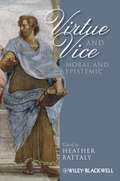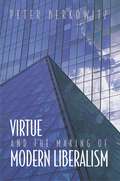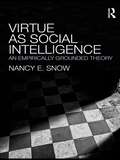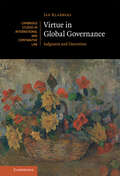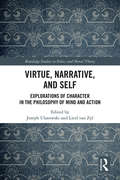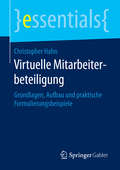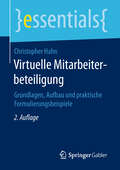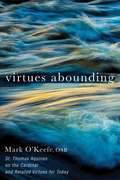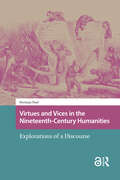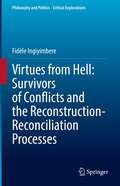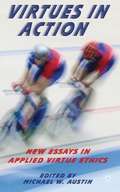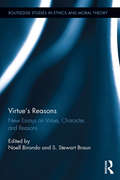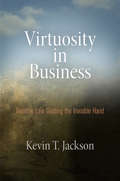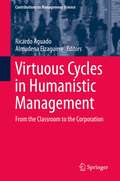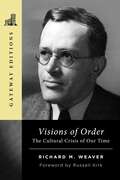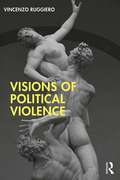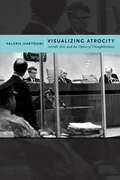- Table View
- List View
Virtue and Vice in Popular Film (Routledge Focus on Film Studies)
by Joseph H. KupferThis book addresses a prominent group of virtues and vices as portrayed in popular films to further our understanding of these moral character traits. The discussions emphasize the interplay between the philosophical conception of the virtues and vices and the cinematic representations of character. Joseph H. Kupfer explores how fictional characters possessing certain moral strengths and weaknesses concretize our abstract understanding of them. Because the actions that flow from these traits occur in cinematic contexts mirroring real world conditions, the narrative portrayals of these moral characteristics can further our appreciation of their import. Humility, integrity, and perseverance, for example, are depicted in Chariots of Fire, The Fabulous Baker Boys, and Billy Elliot, while the vices of envy, arrogance and vanity are captured in Amadeus, Whiplash, and Young Adult. This interdisciplinary work in philosophy and film criticism will be of great interest to scholars and students of film studies, philosophy of film, ethics, aesthetics, and popular culture.
Virtue and Vice, Moral and Epistemic (Metaphilosophy #13)
by Heather BattalyVirtue and Vice, Moral and Epistemic presents a series of essays by leading ethicists and epistemologists who offer the latest thinking on the moral and intellectual virtues and vices, the structure of virtue theory, and the connections between virtue and emotion. Cuts across two fields of philosophical inquiry by featuring a dual focus on ethics and epistemology Features cutting-edge work on the moral and intellectual virtues and vices, the structure of virtue theory, and the connections between virtue and emotion Presents a radical new moral theory that makes exemplars the foundation of ethics; and new theories of epistemic vices such as epistemic malevolence and epistemic self-indulgence Represents one of the few collections to address both the moral virtues and the epistemic virtues Explores a new approach in epistemology - virtue epistemology - which emphasizes the importance of intellectual character traits
Virtue and the Making of Modern Liberalism (New Forum Books #23)
by Peter BerkowitzVirtue has been rediscovered in the United States as a subject of public debate and of philosophical inquiry. Politicians from both parties, leading intellectuals, and concerned citizens from diverse backgrounds are addressing questions about the content of our character. William Bennett's moral guide for children, A Book of Virtues, was a national bestseller. Yet many continue to associate virtue with a prudish, Victorian morality or with crude attempts by government to legislate morals. Peter Berkowitz clarifies the fundamental issues, arguing that a certain ambivalence toward virtue reflects the liberal spirit at its best. Drawing on recent scholarship as well as classical political philosophy, he makes his case with penetrating analyses of four central figures in the making of modern liberalism: Hobbes, Locke, Kant, and Mill. These thinkers are usually understood to have neglected or disparaged virtue. Yet Berkowitz shows that they all believed that government resting on the fundamental premise of liberalism--the natural freedom and equality of all human beings--could not work unless citizens and officeholders possess particular qualities of mind and character. These virtues, which include reflective judgment, sympathetic imagination, self-restraint, the ability to cooperate, and toleration do not arise spontaneously but must be cultivated. Berkowitz explores the various strategies the thinkers employ as they seek to give virtue its due while respecting individual liberty. Liberals, he argues, must combine energy and forbearance, finding public and private ways to support such nongovernmental institutions as the family and voluntary associations. For these institutions, the liberal tradition powerfully suggests, play an indispensable role not only in forming the virtues on which liberal democracy depends but in overcoming the vices that it tends to engender. Clearly written and vigorously argued, this is a provocative work of political theory that speaks directly to complex issues at the heart of contemporary philosophy and public discussion. New Forum Books makes available to general readers outstanding, original, interdisciplinary scholarship with a special focus on the juncture of culture, law, and politics. New Forum Books is guided by the conviction that law and politics not only reflect culture, but help to shape it. Authors include leading political scientists, sociologists, legal scholars, philosophers, theologians, historians, and economists writing for nonspecialist readers and scholars across a range of fields. Looking at questions such as political equality, the concept of rights, the problem of virtue in liberal politics, crime and punishment, population, poverty, economic development, and the international legal and political order, New Forum Books seeks to explain--not explain away--the difficult issues we face today.
Virtue as Social Intelligence: An Empirically Grounded Theory
by Nancy E. SnowVirtue as Social Intelligence: An Empirically Grounded Theory takes on the claims of philosophical situationism, the ethical theory that is skeptical about the possibility of human virtue. Influenced by social psychological studies, philosophical situationists argue that human personality is too fluid and fragmented to support a stable set of virtues. They claim that virtue cannot be grounded in empirical psychology. This book argues otherwise. Drawing on the work of psychologists Walter Mischel and Yuichi Shoda, Nancy E. Snow argues that the social psychological experiments that philosophical situationists rely on look at the wrong kinds of situations to test for behavioral consistency. Rather than looking at situations that are objectively similar, researchers need to compare situations that have similar meanings for the subject. When this is done, subjects exhibit behavioral consistencies that warrant the attribution of enduring traits, and virtues are a subset of these traits. Virtue can therefore be empirically grounded and virtue ethics has nothing to fear from philosophical situationism.
Virtue in Business
by Edwin M. HartmanThe virtue approach to business ethics is a topic of increasing importance within the business world. Focusing on Aristotle's theory that the virtues of character, rather than actions, are central to ethics, Edwin Hartman introduces readers of this book to the value of applying Aristotle's virtue approach to business. Using numerous real-world examples, he argues that business leaders have good reason to take character seriously when explaining and evaluating individuals in organisations. He demonstrates how the virtue approach can deepen our understanding of business ethics, and how it can contribute to contemporary discussions of character, rationality, corporate culture, ethics education and global ethics. Written by one of the foremost Aristotelian scholars working in the field today, this authoritative introduction to the role of virtue ethics in business is a valuable primer for graduate students and academic researchers in business ethics, applied ethics and philosophy.
Virtue in Global Governance: Judgment and Discretion (Cambridge Studies in International and Comparative Law)
by Jan KlabbersSince rules - legal, ethical or otherwise - cannot determine their own application, they require persons of flesh and blood to interpret and apply them in concrete cases. Presidents and prime ministers, judges, prosecutors, mediators, leaders of international organizations, and even religious leaders and public intellectuals make decisions on how best to understand rules and how best to apply them. It stands to reason that their character traits influence the sort of decisions they take. This book provides the first systematic framework for discussing global governance in terms of the virtues, and illustrates it with a number of detailed examples of concrete decision-making in specific situations. Virtue in Global Governance combines insights from law, ethics, and global governance studies in developing a unique approach to global governance and international law.
Virtue, Narrative, and Self: Explorations of Character in the Philosophy of Mind and Action (Routledge Studies in Ethics and Moral Theory)
by Joseph Ulatowski; Liezl van ZylVirtue, Narrative, and Self connects two philosophical areas of study that have long been treated as distinct: virtue theory and narrative accounts of personal identity. Chapters address several important issues and neglected themes at the intersection of these research areas. Specific examples include the role of narrative in the identification, differentiation, and cultivation of virtue, the nature of practical reasoning and moral competence, and the influence of life’s narrative structure on our conceptions of what it means to live and act well. This volume demonstrates how recent work from the philosophy of mind and action concerning narrativity and our understanding of the self can shed new light on questions about the nature of virtue, practical wisdom, and human flourishing. This book will be of interest to scholars and advanced students working in virtue theory, moral philosophy, philosophy of mind and action, and moral education.
Virtuelle Mitarbeiterbeteiligung: Grundlagen, Aufbau und praktische Formulierungsbeispiele (essentials)
by Christopher HahnDas essential vermittelt einen Einblick in den Aufbau, die Funktionsweise und typische Regelungen eines ,,Virtual Share"-Programms zur Mitarbeiterbeteiligung. Der Autor erläutert die Bedeutung der Mitarbeiterbeteiligung als Bestandteil einer zeitgemäßen Unternehmenskultur sowie die Notwendigkeit für junge Unternehmen, ihren strategisch wichtigen key persons besondere Incentives zu bieten, mit denen der Verzicht auf ein höheres Gehalt und Sicherheit im Vergleich zu einer Beschäftigung in einem etablierten Unternehmen kompensiert werden kann. Die virtuelle Mitarbeiterbeteiligung als ein solches Incentive lässt sich rechtlich einfach und schnell umsetzen, und die gesellschaftsrechtliche Position der Gründer und Investoren bleibt davon grundsätzlich unberührt. Das essential enthält zahlreiche Musterformulierungen, die die Umsetzung in die Praxis erleichtern.
Virtuelle Mitarbeiterbeteiligung: Grundlagen, Aufbau und praktische Formulierungsbeispiele (essentials)
by Christopher HahnDas essential vermittelt einen Einblick in den Aufbau, die Funktionsweise und typische Regelungen eines „Virtual Stock Option“-Programms zur Mitarbeiterbeteiligung. Der Autor erläutert die Bedeutung der Mitarbeiterbeteiligung als Bestandteil einer zeitgemäßen Unternehmenskultur sowie deren Notwendigkeit für junge und etablierte Unternehmen, um die talentierten, qualifizierten und leistungsbewussten Mitarbeiter zu halten und zu binden. Das essential enthält zahlreiche Formulierungsbeispiele, die die Umsetzung in die Praxis erleichtern. Die 2. Auflage wurde dabei vollständig überarbeitetet und aktualisiert.
Virtuelle Mitarbeiterbeteiligung: Grundlagen, Aufbau und praktische Formulierungsbeispiele (essentials)
by Christopher HahnDas essential vermittelt einen Einblick in den Aufbau, die Funktionsweise und typische Regelungen eines „Virtual Stock Option Plan“ (VSOP) zur Mitarbeiterbeteiligung. Der Autor erläutert die Bedeutung der Mitarbeiterbeteiligung als Bestandteil einer zeitgemäßen Unternehmenskultur sowie deren Notwendigkeit für junge wie etablierte Unternehmen, um die talentierten, qualifizierten und leistungsbewussten Mitarbeiter zu halten und zu binden. Das essential enthält zahlreiche Formulierungsbeispiele, die die Umsetzung in die Praxis erleichtern. Die 3. Auflage wurde dabei vollständig überarbeitet und aktualisiert. Aktuelle Neuerungen in der Praxis und Gesetzgebung wurden aufgenommen und werden erläutert.
Virtues Abounding: St. Thomas Aquinas On the Cardinal and Related Virtues for Today
by Mark O'KeefeThis book explores, in contemporary language, the practical insights that Aquinas offers for the moral life today. Whether in university, seminary, or adult faith formation settings—whether for a deeper intellectual understanding of virtues or for personal reflection and growth—Virtues Abounding will provide new insight into a classic but too often overlooked storehouse of moral riches.
Virtues and Vices and Other Essays in Moral Philosophy
by Philippa FootPhilippa Foot is regarded as standing out among contemporary ethical theorists because of her conviction that virtues and vices are more central ethical notions than rights, duties, justice, or consequences. This book collects 12 of her essays published between 1957-77 and two new ones. This collection of essays contains discussions of the moral philosophy of David Hume, Immanuel Kant, Friedrich Nietzsche, and some modern philosophers. It presents virtues and vices rather than rights and duties as the central concepts in moral philosophy. Throughout, the author rejects contemporary anti‐ naturalistic moral philosophies such as emotivism and prescriptivism, but defends the view that moral judgements may be hypothetical rather than (as Kant thought) categorical imperatives. The author also applies her moral philosophy to the current debates on euthanasia and abortion, the latter discussed in relation to the doctrine of the double effect. She argues against the suggestion, on the part of A. J. Ayer and others, that free will actually requires determinism. In a final essay, she asks whether the concept of moral approval can be understood except against a particular background of social practices.
Virtues and Vices in the Nineteenth-Century Humanities: Explorations of a Discourse (Studies in the History of Knowledge)
by Herman PaulWhat do scholars do when they talk about virtues (impartiality, accuracy) or vices (dogmatism, prejudice)? Against the common view that such high-minded talk is largely irrelevant to actual scholarly practice, this volume proposes to treat it as a practice in its own right. Drawing on case studies from the nineteenth-century humanities (with occasional forays into physics, chemistry, and medicine), Paul shows that notions of virtue and vice were an evaluative discourse used across the academic spectrum. Paul argues that this evaluative idiom is best studied from a rhetorical point of view, with due attention to repertoires on which scholars drew, explicit or implicit appeals to authority, multi-layered meanings of virtue and vice terms, different uses to which these concepts were put, and societal contexts that lent plausibility to scholars' invocations of virtue and vice. Based on more than a decade of research, this volume will be a key reference for scholars interested in virtues, vices, and the history of the humanities.
Virtues from Hell: Survivors of Conflicts and the Reconstruction-Reconciliation Processes (Philosophy and Politics - Critical Explorations #20)
by Fidèle IngiyimbereThis book offers a critical examination of certain ideas and values—such as remembering, forgiveness, story-telling through Truth and Reconciliation Commissions, etc.—that under-gird the transitional practices and mechanisms of societies emerging from conflicts. It does so by making the survivors’ experience the supreme and ultimate judge of the legitimacy of such practices. While many scholars have dealt with these topics, this book provides a unique perspective on them by using personal stories, narratives and memoirs of the survivors as a checking point of the theoretical elaboration of these ideas and values. By means of an existential phenomenological analysis of the situation of survivors of gross human rights violations, the book assesses how many resources are still available to them, so that they can contribute to the processes of reconstruction and reconciliation of their societies. This analysis constitutes the background for reading the rest of the book, which challenges some assumptions and presumptions of transitional practices such as healing through truth-telling, or providing justice through reparations. It does so by presenting nuanced suggestions on the ways survivors can participate in the reconstruction-reconciliation processes, without jeopardizing their own well-being.
Virtues in Action
by Michael W. AustinIn recent decades, many philosophers have considered the strengths and weaknesses of a virtue-centered approach to moral theory. Much less attention has been given to how such an approach bears on issues in applied ethics. The essays in this volume apply a virtue-centered perspective to a variety of contemporary moral issues, and in so doing offer a fresh and illuminating perspective. Some of the essays focus on a particular virtue and its application to one or more realms of applied ethics, such as temperance and sex or humility and environmental ethics. Other chapters focus on an issue in applied ethics and bring several virtues into a discussion of that issue or realm of life, such as sport, education, and business. Finally, several of the chapters engage relevant psychological research as well as current neuroscience, which enhances the strength of the philosophical arguments.
Virtues of The Mind
by Linda Trinkaus ZagzebskiAlmost all theories of knowledge and justified belief employ moral concepts and forms of argument borrowed from moral theories, but none of them pay attention to the current renaissance in virtue ethics. This remarkable book is the first attempt to establish a theory of knowledge based on the model of virtue theory in ethics. The book develops the concept of an intellectual virtue, and then shows how the concept can be used to give an account of the major concepts in epistemology, including the concept of knowledge. This highly original work of philosophy for professionals will also provide students with an excellent introduction to epistemology, virtue theory, and the relationship between ethics and epistemology.
Virtues, Democracy, and Online Media: Ethical and Epistemic Issues (Routledge Studies in Ethics and Moral Theory)
by Nancy E. Snow Maria Silvia VaccarezzaThis book addresses current threats to citizenship and democratic values posed by the spread of post-truth communication. The contributors apply research on moral, civic, and epistemic virtues to issues involving post-truth culture. The spread of post-truth communication affects ordinary citizens’ commitment to truth and attitudes toward information sources, thereby threatening the promotion of democratic ideals in public debate. The chapters in this volume investigate the importance of helping citizens improve the quality of their online agency and raise awareness of the risks social media poses to democratic values. This book moves from two initial chapters that provide historical background and overview of the present post-truth malaise, through a series of chapters that feature mainly diagnostic accounts of the epistemic and ethical issues we face, to the complexities of virtue-theoretic analyses of specific virtues and vices. Virtues, Democracy, and Online Media will be of interest to scholars and advanced students working in virtue ethics, epistemology, political philosophy, and media studies.
Virtue’s Reasons: New Essays on Virtue, Character, and Reasons (Routledge Studies in Ethics and Moral Theory)
by Noell Birondo S. Stewart BraunVirtues and reasons are two of the most fruitful and important concepts in contemporary moral philosophy. Many writers have commented upon the close connection between virtues and reasons, but no one has done full justice to the complexity of this connection. It is generally recognized that the virtues not only depend upon reasons, but also sometimes provide them. The essays in this volume shed light on precisely how virtues and reasons are related to each other and what can be learned by exploring this relationship. Virtue’s Reasons is divided into three sections, each of them devoted to a general issue regarding the relationship between virtues and reasons. The first section analyzes how the virtues may be related to, or linked with, normative reasons in ways that improve our understanding of what constitutes virtuous character and ethical agency. The second section explores the reasons moral agents have for cultivating the virtues and how the virtues impact moral responsiveness or development. The final section examines how reasons can be employed in understanding the nature of virtue, and how specific virtues, like modesty and practical wisdom, interact with reasons. This book will be of major interest to scholars working on virtue theory, the nature of moral character, and normative ethics.
Virtuosity in Business
by Kevin T. JacksonThe recent global financial crisis raises pressing issues that are not exclusively economic. The health of the economy, Kevin T. Jackson contends, reflects the moral health of the wider culture: ethics must be considered along with economics to understand world markets, especially now that globalization and other forces have increasingly complicated the regulation of transnational corporate conduct. Virtuosity in Business calls on businesspeople and ethicists to expand their thinking by stressing the profound relevance of philosophy to business and economics.Virtuosity in Business shows that ethics has been the overriding problem for business and that it is the only enduring solution. Drawing on a variety of philosophical sources, including Aristotle, Thomas Aquinas, and Jean-Paul Sartre, Jackson applies the concept of virtue to the competitive realm of the marketplace. Virtuosity, in all realms of human endeavor, is not merely a display of technical skill or adherence to conventional norms. The invisible law of virtuosity, which discourages misconduct and rewards good corporate citizenship, guides ethical firms and wise entrepreneurs toward greater success by playing a constructive part in the human enterprise.A pioneering work in the contemporary philosophy of business, Virtuosity in Business revivifies business ethics to address concerns arising from the global financial crisis, such as restoration of faith in the market, respect for human rights, and environmental sustainability.
Virtuous Cycles in Humanistic Management: From the Classroom to the Corporation (Contributions to Management Science)
by Ricardo Aguado Almudena EizaguirreThis volume is divided into three major parts, each of which symbolizes a new virtuous circle that is added to the previous one in order to foster the dissemination of humanistic management (HM) among corporations and social institutions. After an introductory chapter explaining the concept of humanistic management and the plan behind this research project, the first part of the book is devoted to education. The authors address pedagogical strategies that can be used in higher education to introduce students to HM.In turn, the second part of the book focuses on the implementation of HM in corporations, while the third presents an approach for measuring and monetizing the social value generated by corporations through their economic activities. In the closing chapter, the editors illustrate how the three parts of the book can be combined to generate virtuous cycles in corporations.
Virtuous Thoughts: The Philosophy of Ernest Sosa
by John TurriThis collection is a major contribution to the understanding and evaluation of Ernest Sosa's profound and wide-ranging philosophy, in epistemology and beyond. A balanced, fair and critical volume, it offers a sensitive appreciation of his wide philosophical purview, a nuanced assessment of the detail of his thought, and a spur to exploring the linkages between the varied topics explored by the subtle mind of this great American scholar. The papers explore a wealth of Sosa's academic interests, including his work on philosophical method, the philosophy of mind and language, metaphysics, and value theory, in addition to his output on epistemology itself. It offers, for example, a rebuttal of the counterarguments to Sosa's reliabilist theory of introspective justification, which itself concludes with some objections to Sosa's stated views on the 'speckled hen' problem. Other authors track the connections of his virtue theory to his advocacy of bi-level epistemology, provide reflections on Sosa's views on the epistemological tradition, and examine the nexus of his beliefs on intuition and philosophical methodology. This volume is an insightful reckoning of Sosa's academic account.
Virtuous and Vicious Expressions of Partiality (Routledge Studies in Ethics and Moral Theory)
by Eric J. SilvermanThis volume gathers essays from leading scholars to discuss partiality in ethics. The chapters examine the virtuous and vicious ways in which we relate to those close to us. There has long been a puzzle in ethics concerning the balance between our general moral obligations to everyone and our specific moral obligations to a smaller subset of people: our family, our nation, and our friends. There has been longstanding tension between the moral intuition that equality entails that we have the same moral duties to everyone and the moral intuition that special obligations entail that we have much greater duties to those close to us. The chapters in this volume discuss varying perspectives on partiality within a wide range of relationships. Section 1 offers overarching visions of partiality. Section 2 examines how roles and relationships might shape partiality. Section 3 focuses on the potential moral dangers and pitfalls of partiality. Finally, Section 4 looks at specific applications of partiality expressed as our loyalty to country, religion, sports teams, and employers. Virtuous and Vicious Expressions of Partiality will be of interest to scholars and advanced students working in ethics, social and political philosophy, and philosophy of religion.
Visions of Order: The Cultural Crisis of Our Time
by Richard M. WeaverAn essential work from scholar and rhetorician Richard Weaver, a leading figure in the rise of the modern conservative intellectual movement.
Visions of Political Violence
by Vincenzo RuggieroIn this book, Vincenzo Ruggiero offers a typology of different forms of political violence. From systemic and institutional violence, to the behaviour of crowds, to armed conflict and terrorism, Ruggiero draws on a range of perspectives from criminology, social theory, political science, critical legal studies and literary criticism to consider how these forms of violence are linked in an interdependent field of forces. Ruggiero argues that systemic violence encourages more institutional violence, which in turn weakens the ability of citizens to set up political agendas for change. He advocates for a reduction of all types of violence, which can be enacted through fairer distribution of resources and the provision of political space for contention and negotiation. This book will be of interest to all those engaged in research on violence, terrorism, armed conflict and the crimes of the powerful. It makes an important contribution to criminological and social theory.
Visualizing Atrocity: Arendt, Evil, and the Optics of Thoughtlessness (Critical Cultural Communication #3)
by Valerie HartouniVisualizing Atrocity takes Hannah Arendt’s provocative and polarizing account of the 1961 trial of Nazi official Adolf Eichmann as its point of departure for reassessing some of the serviceable myths that have come to shape and limit our understanding both of the Nazi genocide and totalitarianism’s broader, constitutive, and recurrent features. These myths are inextricably tied to and reinforced viscerally by the atrocity imagery that emerged with the liberation of the concentration camps at the war’s end and played an especially important, evidentiary role in the postwar trials of perpetrators. At the 1945 Nuremberg Tribunal, particular practices of looking and seeing were first established with respect to these images that were later reinforced and institutionalized through Eichmann’s trial in Jerusalem as simply part of the fabric of historical fact. They have come to constitute a certain visual rhetoric that now circumscribes the moral and political fields and powerfully assists in contemporary mythmaking about how we know genocide and what is permitted to count as such. In contrast, Arendt’s claims about the “banality of evil” work to disrupt this visual rhetoric. More significantly still, they direct our attention well beyond the figure of Eichmann to a world organized now as then by practices and processes that while designed to sustain and even enhance life work as well to efface it.
